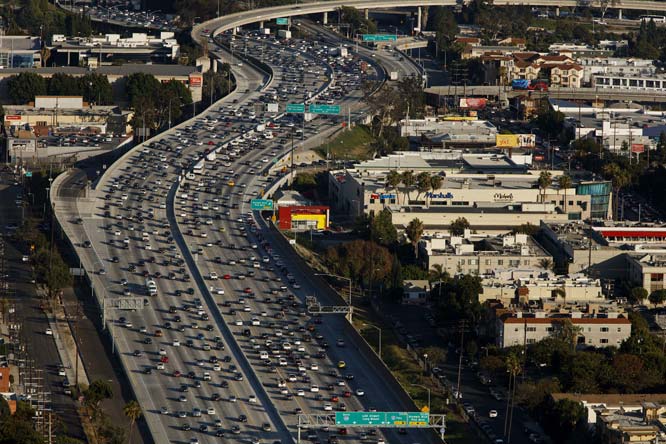 Rush hour at the Interstate 405 freeway and 10 freeway interchange, Los Angeles. Patrick T. Fallon / Bloomberg
Rush hour at the Interstate 405 freeway and 10 freeway interchange, Los Angeles. Patrick T. Fallon / Bloomberg
L.A. Metro officials want to explore the possibility of converting carpool lanes into toll lanes, taxing drivers based on their mileage and charging vehicles to enter some neighborhoods or business districts, the Los Angeles Times reported.
The higher costs would take vehicles off the road; reduce air pollution, including climate-changing greenhouse gases; and raise extra revenue to improve its highway network and expand mass transit before the 2028 Summer Olympics, the paper said. The proposal to charge vehicles by the mile would raise $102 billion over 10 years, and a downtown entrance fee would raise $12 billion, the Times reported, citing agency estimates.
"Congestion pricing offers a compelling mobility solution that can also generate substantial revenues that can be used for transit operations and capital construction," the L.A. Metro's board report says.
But will it fly in car-centric L.A.? The Times, noting that three out of four commuters drive to work, casts the plan's approval as an act of courage.
"It challenges what Angelenos see as their G od-given right to drive anywhere they want," Manuel Pastor, director of USC's Program for Environmental and Regional Equity, told the Times. "It would be a challenging shift in a city that's very much a car culture and an individual culture."
The package of proposals - dubbed "Twenty Eight by '28″ - will sound familiar to commuters in Washington, D.C., who have been paying as much as $46.75 to ride Interstate 66 inside the Beltway during rush hour. The Washington Area Bicyclist Association and the Greater Washington Partnership have also urged the city to consider tolling vehicles to enter the downtown area, the way London and other cities do. New York City has been flirting with the idea as well.
The movement has gained ground with a confluence of forces. The urban renaissance of recent years has brought more people and traffic to many cities, but it has also exposed weaknesses in the legacy mass-transit systems that serve them. At the same time, as people push for more environmentally sustainable cities and ways to make them safer for pedestrians and bicyclists, ideas such as charging people to use interstates or restricting vehicles from business districts don't seem so far-fetched. Virginia Gov. Ralph Northam and Republican lawmakers this month unveiled a bipartisan plan to toll Interstate 81 to finance critical improvements.
But Los Angeles is different. Although it's easy to exaggerate the importance of the automobile there, it became the first distinctively American megacity that happened to be tied together with a ribbon of freeways.
"For a Californian, leaving his car means leaving his own humanity," the writer Umberto Eco once said - an offhand swipe in an essay on Disneyland. Living without a car is in L.A. is practically the stuff of memoir.
The L.A. Metro report, drawn up by staff for the board to consider, makes it clear that more prosaic means are under study for funding the city's transportation needs, but those are also less likely to rile people up. In addition to congestion tolling and charging vehicles by the mile, the proposal includes raising additional money with "new mobility fees" on scooters or other new urban modes of transportation. The Los Angeles County Metropolitan Authority is expected to take up the proposal soon.
Every weekday JewishWorldReview.com publishes what many in the media and Washington consider "must-reading". Sign up for the daily JWR update. It's free. Just click here.
(COMMENT, BELOW)


 Contact The Editor
Contact The Editor
 Articles By This Author
Articles By This Author